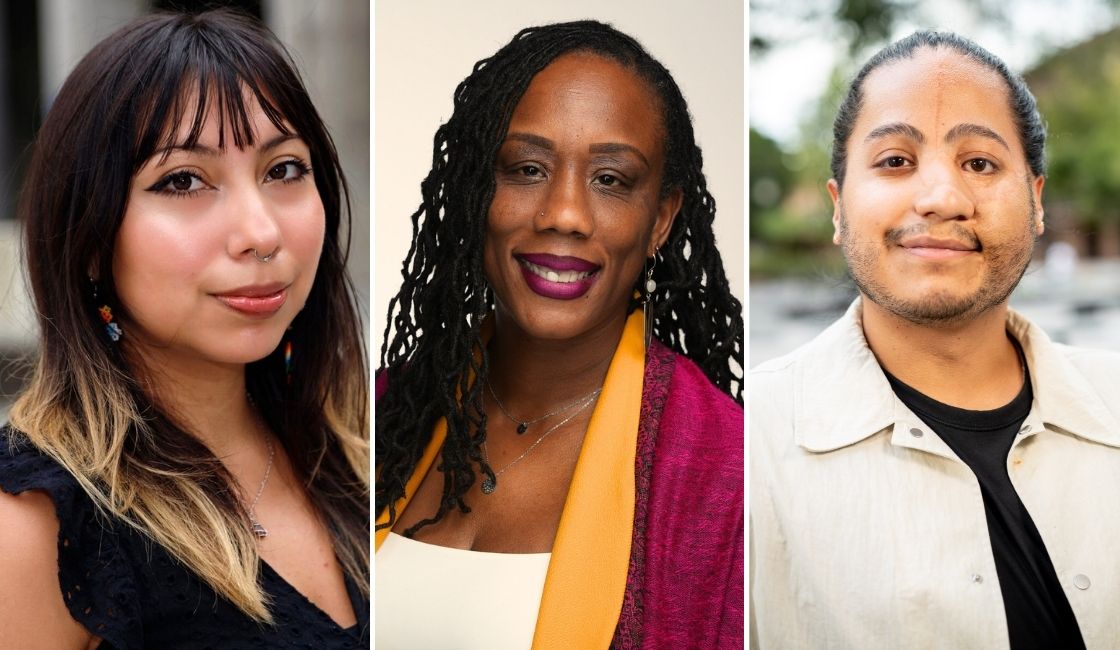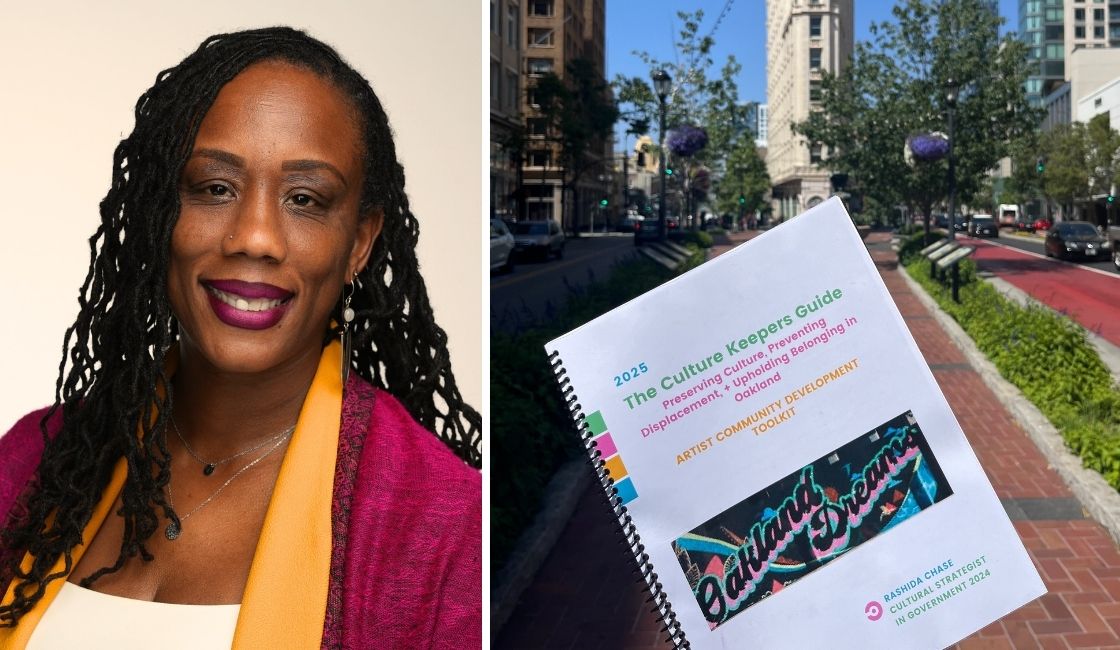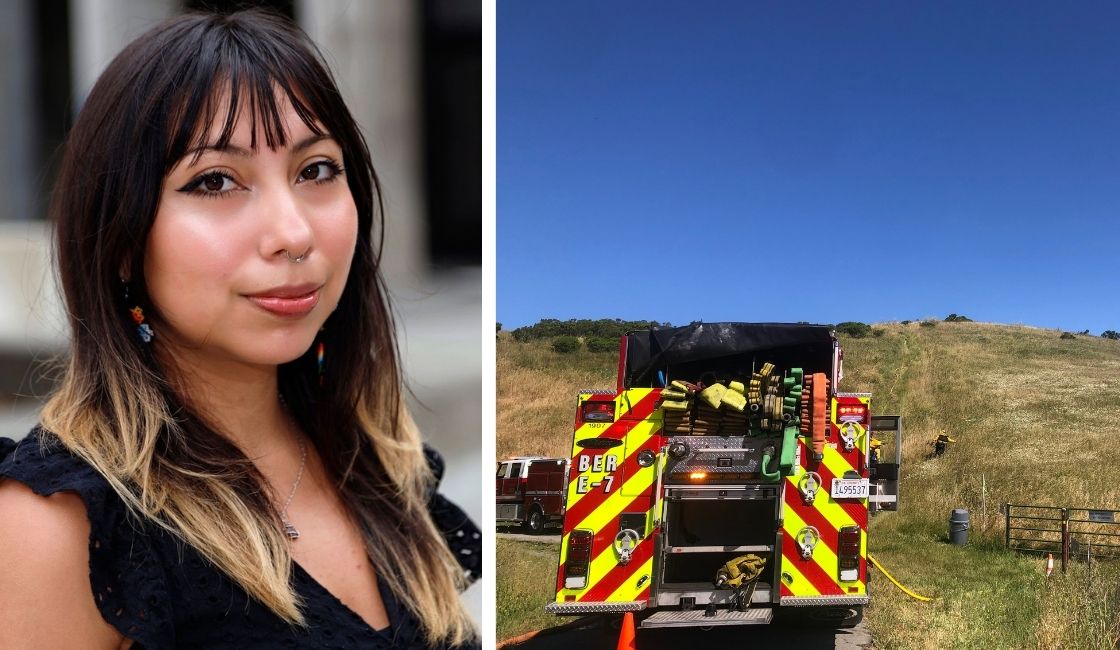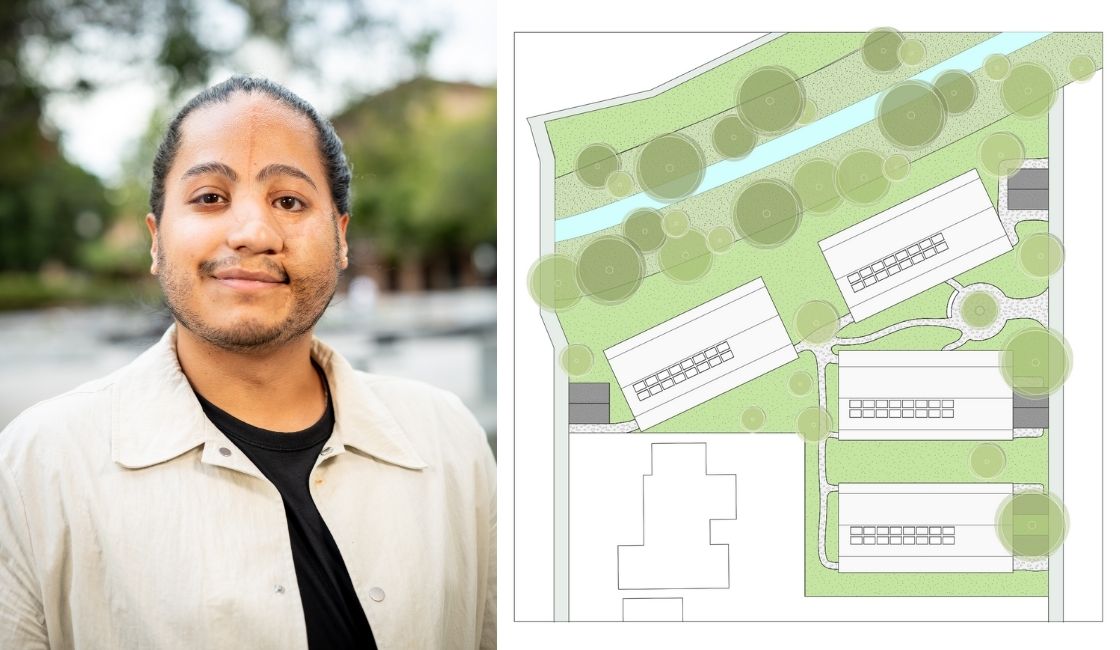Arcus Fellows make meaningful social justice impact, drive community change
Meet three Arcus Fellows — Rashida Chase (MRED+D 2024), Elizabeth Garcia (MLA 2027), and Sam Rodriguez (MArch + MCP 2026) — who are using design, planning, and research to impact communities.

The Arcus Social Justice Corps Fellowship, launched in 2021 at the College of Environmental Design, was founded on a compelling hypothesis: that empowering students who are deeply committed to both social and environmental justice can drive tangible, community-based change while in school and beyond. Now entering its fifth year, the program is proving the hypothesis correct, as both current Arcus Fellows and recent alums are making measurable impacts in cities and communities across the country and in UC Berkeley’s backyard.
CED caught up with three Arcus Fellows — two current master’s students and one recent graduate — from across environmental design disciplines who are already making meaningful, tangible impacts in local communities. Ideas they developed inside Bauer Wurster Hall are being realized outside the bounds of the academy as they use their educational training to identify and address real-life issues in the built environment that impact vulnerable communities.
Rashida Chase (MRED+D 2024): Shaping Oakland’s cultural future through policy and planning

Rashida Chase’s decision to apply to the Master of Real Estate Development + Design (MRED+D) program at UC Berkeley was directly motivated by the displacement of artists in her Oakland community. She knew she needed the skillsets of a developer in order to enact the kind of change she and her neighbors wanted to see in their city, but attending graduate school seemed impossible until she learned about the Arcus Fellowship at CED. Now, equipped with a MRED+D degree, she’s helping to shape Oakland’s cultural future.
As a native Oaklander, vocalist/artist, and former community engagement director for AMP (Art, Music, and Performance) Oakland, a placemaking initiative and partnership with the Uptown Downtown Association, Chase witnessed many fellow artists losing their housing, rehearsal space, and studios due to rising costs. This became the focus of her MRED+D capstone project, Keeping Oakland Creative: How Development Can Support the Creative Cultural Class of Oakland. The capstone was a deep dive into existing policies — including the Downtown Specific Plan, the General Plan’s housing element, and a new state law, AB812 — that could be leveraged to mandate affordable housing and studio or practice space for artists.
Chase’s capstone research and proposal immediately translated into her professional work following graduation. She was selected as a cultural strategist in government while still in the MRED+D program, working with Oakland Councilmember Carroll Fife on the preservation and activation of the Black Arts Movement Business District (BAMBD), located along the 14th Street corridor in Downtown Oakland and West Oakland.
Currently, Chase is working with the Cultural Affairs and the Economic and Workforce Development Department to create the framework for all future cultural districts in Oakland. Her focus is on using AB812 — which requires 10% affordable housing for artists within a half-mile of state-designated cultural districts — to strategically create overlapping districts, effectively making the entire city a “cultural district” where artist housing is required.
Chase’s work is also embodied in The Culture Keeper’s Guide, an Artist Development Toolkit, a comprehensive, living document she developed during her first term as a cultural strategist in government as a resource for all stakeholders. The toolkit aims to help other communities prevent displacement by explaining the development process, identifying key city players, and empowering artists and arts organizations to insert themselves into policy processes.
“For me, these projects are necessary cultural infrastructure: artists of all kinds have places to perform and present their work, and they have homes to come back to,” says Chase.
Elizabeth Garcia (MLA 2027): Building equity into Berkeley’s disaster preparedness planning

Elizabeth Garcia, Master of Landscape Architecture candidate and Arcus Fellow, is at the forefront of landscape architecture, disaster resilience, and social equity. She applies her research to real-world preparedness projects primarily through her work with the Berkeley Fire Department and its Office for Emergency Services (OES) as a hazard mitigation and community outreach intern. The Berkeley Fire Department bases its recommendations on whether or not Berkeyans should leave their homes during Extreme Fire Weather in part on Garcia’s research.
Garcia’s academic and professional efforts are grounded in a realistic assessment of infrastructural capacity in cities. She’s interested in understanding how cities were designed and developed in ways that put them at risk for certain hazards, like wildfires.
“The failure of past urban development to acknowledge fire ecology is one of the root causes of the current high-risk situation,” says Garcia. “So is the tendency of planners of the past to ignore Indigenous land management practices.”
At OES, she helped prepare an evacuation time study and communicate its findings to Berkeley residents through story maps and in-person community outreach. Garcia’s goal is to help households make a plan for evacuating, noting that we need to shift the perception to “when” not “if” a disaster will strike. The study also informed the formulation of EMBER, the fire department’s new home hardening policy that aims to limit the spread of wildfires by creating a fire break in the hills.
One of Garcia’s priorities at OES is highlighting the critical need to address the evacuation needs of vulnerable groups like the elderly and people with disabilities. “We emphasize the need to evacuate as early as possible, which can be difficult for some people. Right now, we’re trying to create ‘leave early’ zones and are targeting access-impaired areas with older community members, like Redwood Gardens.”
“During the December 2024 tsunami warning, it was clear that Berkeley community members didn’t know where to go. Elizabeth combined the state’s technical data with her GIS expertise to create accurate, easy-to-use tsunami evaluation maps tailored for West Berkeley residents.”
— Sarah Lana, CEM, Emergency Services Manager, City of Berkeley
While much of the public discourse around disaster preparedness in Berkeley focuses on the wildfire-prone Berkeley Hills, with more affluent residents, one of Garcia’s biggest contributions is refocusing attention on the vulnerability of West Berkeley. The Berkeley flats, closer to the bay and traditionally working class, face the risk of flooding, tsunamis, and power outages, she notes.
“I’ve done workshops and community outreach events on extreme heat and flooding in the flats. As a Spanish speaker, I am able to translate and talk with the area’s many Spanish-speaking families who want to prepare their households for potential climate threats.”
Sam Rodriguez (MArch + MCP 2026): Designing dignified affordable housing for North Richmond

Arcus Fellow Sam Rodriguez, who is pursuing dual master’s degrees in architecture and city planning, spent the summer of 2025 interning with Densify Lab, a real estate development and consulting company founded by Arcus alum Preston Lam (MRED+D 2023). He worked alongside a small team of other Arcus Fellows, including Troy Neves (MArch 2025) and Diana Quintero (MCP 2025), to address the critical shortage of affordable homeownership opportunities in North Richmond, an unincorporated community 10 miles north of Berkeley.
The team helped Richmond LAND, an emerging community land trust, explore affordable housing designs for a 26,500-square-foot site with four dilapidated former public housing duplexes. To keep project costs low, Rodriguez developed an adaptive reuse concept plan of the existing structures: His design preserves the existing buildings while adding thoughtful new elements like covered front porches and communal courtyards. “These are key elements to foster a sense of shared abundance,” says Rodriguez, drawing on a key principle of equitable development.
“As the first community land trust in Richmond driven by our community members, we do not have the expertise in all of these areas. Receiving support from folks who share the same passion for community-driven solutions is needed for organizations like ours to grow. This resource allowed our organization to move quickly in this current environment to start engaging in the development process.”
— Princess Robinson, Executive Director, Richmond LAND
Rodriguez used his planning background to inform the architectural intervention, integrating an understanding of the site within the community. His proposal was sensitive to the existing older housing stock of the neighborhood, deliberately avoiding a “glossy new” look. The intervention also acknowledges a local elementary school by incorporating a community garden along the western edge of the site to provide educational opportunities and strengthen neighborhood cohesion.
This project perfectly embodies the goal of the Arcus Fellowship: Rodriguez leveraged his architectural and planning skills to address the systemic issue of housing through the lens of equity. Though the architect leading conceptual design, Mithun, will ultimately choose or combine elements from multiple proposals, including Rodriguez’s, the experience gave him the invaluable opportunity to consult for a nonprofit client on a project actively moving toward construction.
“North Richmond has faced years of inequality,” says Rodriguez, “so it was incredible to be part of making this project come alive.”
The Arcus Social Justice Corps Fellowship at the College of Environmental Design offers an unmatched opportunity for graduate students seeking to make direct and transformational social change in the world through planning, research, and design. The Arcus Fellowship offers free tuition and a basic needs stipend, plus community building and professional networking to students enrolled in any of our master’s degree programs. The Arcus Social Justice Corps Fellowship was established with the goal that fellows graduate with little or no debt, giving fellows the freedom to pursue careers that make a big difference in society. Arcus Fellows commit to working in social impact careers for at least three years after earning their degrees. By working in nonprofits, NGOs, higher education, or government agencies — or by creating their very own forms of new radical practice — Arcus Fellows move the needle on essential social change.